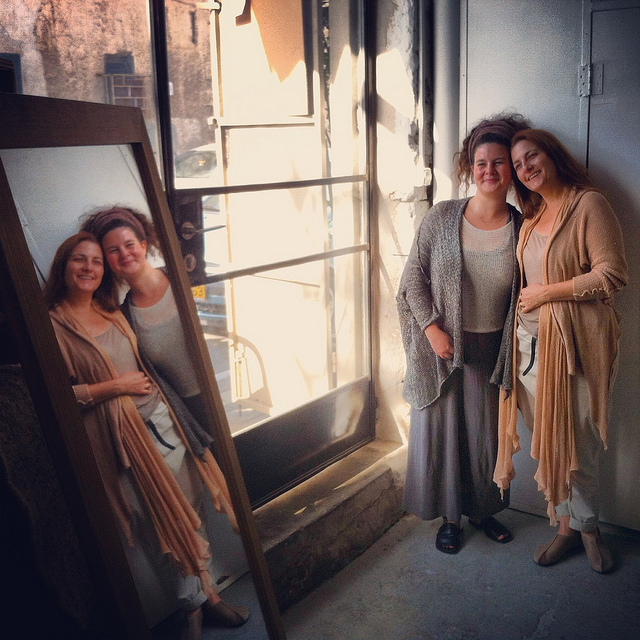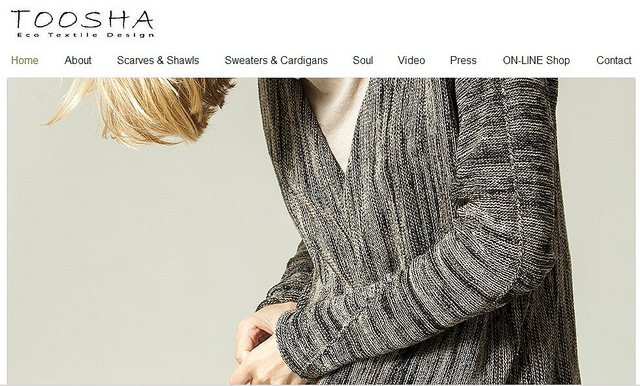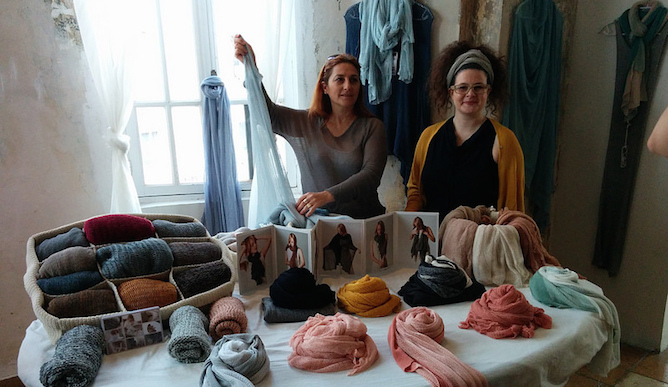Walking down the small side-street in Jaffa where Toosha Eco Textile Design is located, one might easily miss what is “looming” inside. Beyond its unassuming storefront, however, lies an Israeli treasure that is beginning to gain national and international acclaim in the fashion industry.
Established four and half years ago by a mother-daughter team whose complementary skills and passions came together to create both a business and beautiful knits, Toosha’s concept is based on the use of ecologically friendly fabrics, handmade on the premises from all-natural, biodegradable materials. These include not only the more common cottons, linens and wools, but bamboo and soy, as well.
“Our fabrics live and breathe,” co-owner Tzameret Shapira-Moatti tells ISRAEL21c, in the loft above the ground floor where she and her daughter, Tom Moatti-Kedem, spend their days designing and creating their wares. “Each item is not only comfortable, but and takes the shape, energy and personality of its wearer.”
The idea for Toosha (Tom’s childhood nickname) came to the young woman – now 28 – during her studies at the prestigious Shenkar College of Engineering and Design in Ramat Gan. A major in textile design, with a specialty in knitting, Tom knew by her second year “that this was what I wanted to do with my life.”
By the time she graduated – with honors – she and mother Tzameret, 49, had already formed their company and were steadily gaining clientele, primarily through word of mouth. This is in spite of doing everything out of Tom’s small apartment and her parents’ home nearby.

Their decision to use only ecology-friendly yarn derived from Tom’s education at Shenkar.
“During my first year, we were given a lecture by a woman from the Royal College of Art in London, who spoke about the textile industry’s being the second largest in the world,” explains Tom. “And that is when I understood how important the ecological aspect of the field was.”
The collaboration with her mother turned out to be a perfect fit. Tzameret, a teacher of art therapy with a degree from Camera Obscura College in Haifa, was taking a break from her career, just as Tom was ready to launch her own. Tzameret had spent years helping children with autism and emotional problems, and more recently women suffering from depression, using art to enhance empowerment and self-expression.
Her desire for a change – coupled with a love of fashion, as well as art and organizational skills – made her the perfect partner for her daughter, who was hungry to begin building a business. In addition, Tzameret, like Tom, was not fond of synthetic materials.
“Nature is something significant in both our lives,” says Tzameret. “It is our main inspiration.”
Exclusively ecological
Awareness about ecological textiles “was in diapers when we started out,” says Tom. “Though at the time there were a couple of places in Israel using natural fabrics, we were the first to use exclusively ecological materials.”

This kind of specialty yarn is not produced locally, however. So the two women engaged in serious research to find factories from which to import it. They also had to calculate the amount of yarn they would need for their purposes, and how to price the merchandise they produced from it.
“Ecological materials are more costly than synthetics,” says Tzameret, who is responsible for marketing, while Tom focuses on design. “Furthermore, we are a small company, and the smaller the order, the more expensive.”
Today, they purchase the bulk of their yarn from Turkey, Europe and the Far East.
A year and a half ago, when their business had outgrown their homes — cluttered with yarn, vats for dying fabric and an assortment of shawls, shirts and sweaters – they opened their shop in Jaffa, near the apartment that Tom shares with her husband.
The ground floor of the shop houses a loom and creative space for Tom and four employees, who work in shifts examining the final products for flaws and crocheting seams. The loft above serves as an office and meeting place for mother and daughter to plan their seasonal collections.
Though customers can buy items in the shop by appointment, Toosha sells mainly to stores in Israel and abroad, and to individuals via the Internet.
More than a dozen hand-stitched manila envelopes, addressed to buyers all over the world, are stuffed with merchandise and ready to be mailed – another task that mother and daughter handle by themselves. On the adjacent desk are boxes full of bits and pieces of materials and photographs of sand, leaves, branches and landscapes that provide the inspiration for their designs.
This is not to say that everything runs smoothly. When asked whether they ever argue, as mothers and daughters tend to do, Tom and Tzameret laugh.
“Of course!” they say in unison.
This is a function of their making every design and administrative decision together, a process that frequently leads to disagreements. And it so consumes their every waking moment that they had to promise the other people in their lives (such as Tom’s father, a professional photographer, and younger brother, who works in high-tech) that they would occasionally talk about something else at family gatherings.
After all, “body, home and soul” is the Toosha concept.
For more information, see www.toosha.com.












